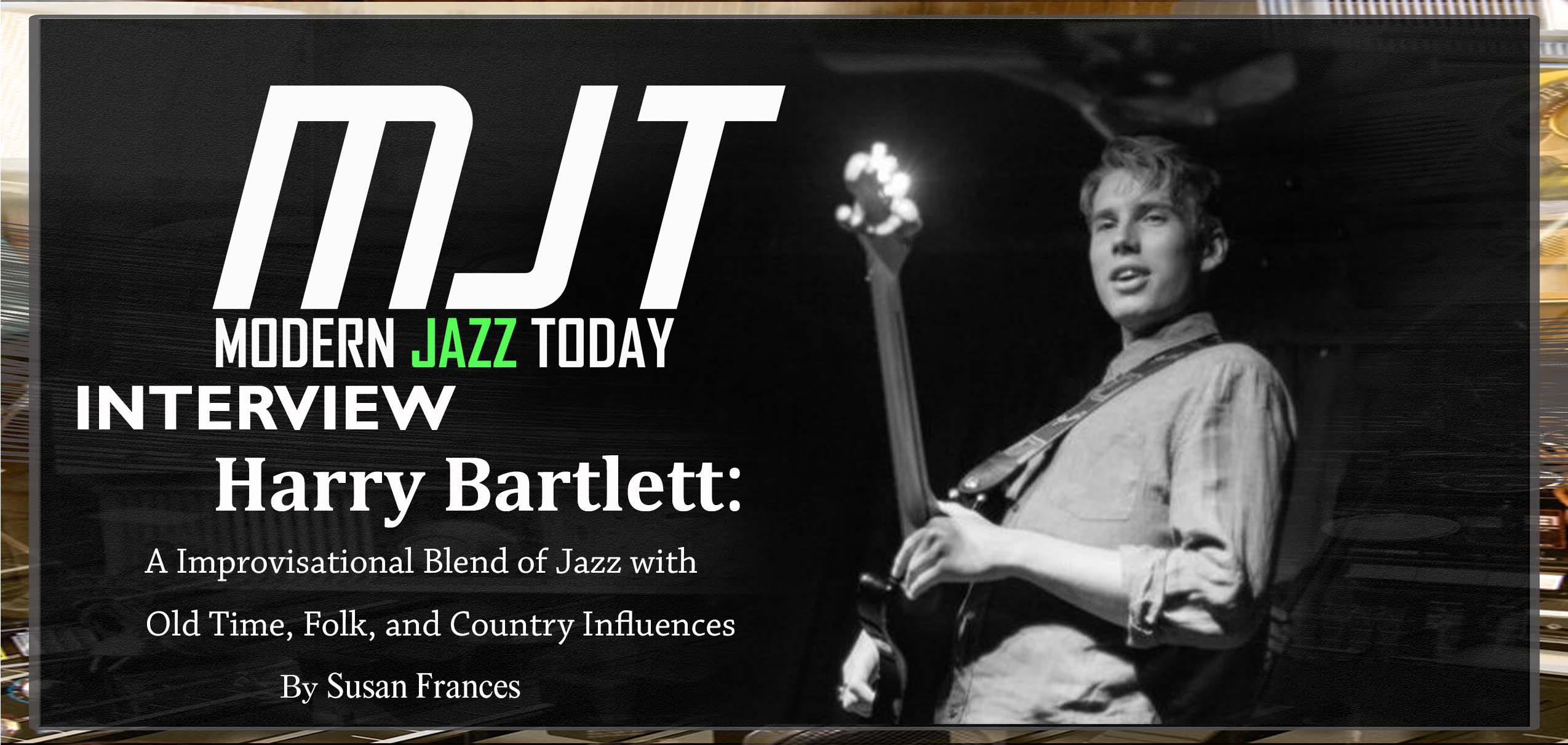Harry Bartlett: A Improvisational Blend of Jazz with Old Time, Folk, and Country Influences
by Susan Frances

“Writing music has always felt like the end goal,” he asserts. “When I started playing, I’d learn songs to learn what was going on in them. From there, I could write my own thing like it. This is still the motivating factor for any transcription work I do, and most of my compositions are the result of some study.”
“Transcribing and analyzing music,” he describes, “acts as a kind of ‘cold start’ for my creative process. Once I grasp a new thing, be it melodic, rhythmic, or formal, I get really excited and can’t help but write my own piece around it.”
Bartlett earned a Bachelor of Music degree with honours from the University of Toronto’s Faculty of Music (2016-2020) and attended the School of Improvised Music in Brooklyn, New York (2019). He is the recipient of multiple awards, including the Suba Institute Award for Performance Excellence, the Mary Alice Stuart Jazz Scholarship, and the TD Niagara Jazz Festival Jazz for the Ages Award.
Harry has toured public schools across Canada, leading improvisation workshops. He developed these workshops in 2019 with the aid of the FMUA (Faculty of Music Undergraduate Association in Toronto). FMUA released his latest recording Wildwood made with his trio, comprised of bassist Caleb Klager and drummer Harry Vetro in November 2022. In addition, the trio had released their self-titled debut EP prior.
Bartlett explains how he met his bandmates, “We were all at the University of Toronto together studying Jazz Performance. We started playing under very chance circumstances.”

“Caleb got us a gig,” he cites, “in the basement of a hostel on Church Street, and no more than a month later, we went out to Harry Vetro’s house in Stoney Creek, Ontario, to record our EP. About a year later, we toured Canada.”
“We became really good friends through this,” he cherishes. “We also share a lot of mutual influences. We all love old folk and country music and began integrating these into our sets; songs popularized by Hank Williams, Ricky Nelson, and Johnny Cash.”
“We’ve also spent a lot of time listening to records that draw both on jazz and folk idioms,” he recollects, “such as Bill Frisell’s Disfarmer, and The Brian Blade Fellow Ship Band’s Landmarks. This common understanding of where we’re coming from and where we want to go is what makes me want to tour and make records with them!”
Their first endeavor was their self-titled debut EP, which Bartlett comments about the recording, “The EP feels like a document in time. We had just begun playing together and were feeling good about it. We recorded about 10 tunes that had been written between Caleb on myself. We selected a shorter set from these to feature on the EP – 3 by me and 1 by Caleb.”

The trio recorded the album on Gambier Island in British Columbia, a setting that Bartlett provides, “Gambier Island is a small community between Squamish and Gibsons, British Columbia. My family has some property there, and it has always been a really special place for me.”

“I’d say,” he discerns, “about 90% of the music I write is written from a visualization of this place or others in the Pacific North West.”
“When things shut down in 2020,” he remembers, “I was there as quick as I could and lived on the island for just over a year. I had never had so much time and isolation to work in, and it was a real privilege. To give an idea, in January, you might run into someone once a week or two. There is no car access and no commerce on the island.”
“The pieces on Wildwood represent 9 of 15 that were prepared,” he credits. “I feel confident saying that they are all inspired by Gambier or other experiences in the natural world.”

When speaking about the track “Jellybean” from Wildwood, he remarks, “That’s a cute one! ‘Jelly Bean’ is the name of my rowboat. She’s an old Walker Bay. I spent hours a day out fishing in Jelly Bean as a child, and when I was back living on Gambier and the wind would hold up for a day, I’d row down to Cotton Bay, set a crab trap, and pull up on the beach to have a fire and read before heading back in the late afternoon. Love Jellybean.”
He surmises, “I think that making an album is a great way to clear the slate. It’s like a journal in that I can take this thing that represents so much of my headspace and transfer it to a physical medium. And in that vacuous space, new things come flooding in!”
“Since recording Wildwood,” he observes, “I’ve been exploring a lot of new music, the most present of which being Appalachian folk music – Bluegrass, Old Time, Country. I have a few new Bluegrass projects with varying infusion of ‘the avant-garde.’ I also have a singer-songwriter project that is played with other improvising jazz musicians but rooted in that American folk tradition.”
Harry Bartlett has a solid history of studying music rooted in bluegrass, folk, country, and jazz improvisation, reaching as far back as his upbringing. He shares, “I was always interested in improvising. My dad, who I suppose was my first teacher, used to play Herbie records and play along with them. Makes sense that’s the kind of stuff he wanted to show me how to do. The first thing he showed me was the pentatonic scale.”
“My dad is a big player,” he admires, “so guitars were always around the house. My sister, who is also making a career in music, and I were both pretty lucky to learn on Martin and Fender guitars!”
“When I was 15,” he considers, “I had injured myself and was unable to do much physically. In this time, I really got excited about music and the guitar. I was enamoured by guitar players like David Gilmour. I think his honesty and clarity left an impression on me. The first jazz guitar player I got really into a couple years later was Jim Hall. They both seem similar to me in this regard.”

“In my later high school years,” he chronicles, “I studied Jazz Guitar with Bill Coon in Vancouver. He was a really inspiring and encouraging person for me. Bill had a close relationship with Jim Hall and put me on to his records, and I transcribed a lot of his playing. He was my first big obsession!”
“More recently,” he points out, “some of my inspirations include Bill Frisell, Brian Blade, Brad Mehldau, Paul Motian, and Ron Miles.”
“I’m also listening to a lot of Appalachian folk music,” he highlights, “and am interested in approaching those forms through perspectives I’ve picked up playing jazz.”
“When I moved out here [to Toronto] in 2016, I started studying with a guitarist named Geoff Young,” he reveals. “It’s hard to know where to even start with him because he has totally shaped the way I think about everything. He’s wide open and so specific at the same time. His tastes aren’t filtered through convention but through an acute connection to himself. Geoff worked with me on Wildwood through the pre-production stages.”
Bartlett’s move to Toronto availed him of new sources of inspiration, as he purports, “There are lots of other players in Toronto, both mentors and peers, who really inspire me. Of course, Caleb Klager and Harry Vetro, and also Andrew Downing, Madeleine Ertel, Kurt Newman, Nick Fraser, David Hodgson, Dan Pitt, Patrick O’Reilly, and many others.”
“I feel very grateful for the Tranzac Club here in Toronto,” he underscores. “It’s the best place in the world.”

“In a five-minute piece of music,” he articulates, “the relative significance of one note is negligible, but it’s easy to lose sight of that when recording.”
“Live performance is an ephemeral thing,” he perceives, “and recorded music, especially when improvisation is involved, is still performed as such, but the resulting product is one that can be repeated.”
He assesses, “I think that live and recorded music are ultimately different art forms, and I hope to keep learning about how to navigate each.”
When Bartlett is not working on his music, he plunges himself into the creative works of authors, filmmakers, and directors, admitting, “I’m a huge fan of Cormac McCarthy and David Lynch! I’m excited to get into the two new novels that McCarthy just came out with, and am currently watching Twin Peaks for the 3rd or 4th time. I have a band that puts on an annual David Lynch/Angelo Badalamenti concert!”
He confesses, “I also like to take every opportunity I can to get out of the city and go hang out with trees.”
Growing up in the Northwest Pacific has allowed Harry Bartlett to achieve a balance, being able to absorb new influences while enabling his individual creativity to materialize. Analyzing songs and finding the root of a composition is a labor of love for Bartlett and his path to creating his own compositions.
About Susan Frances:






No Comments